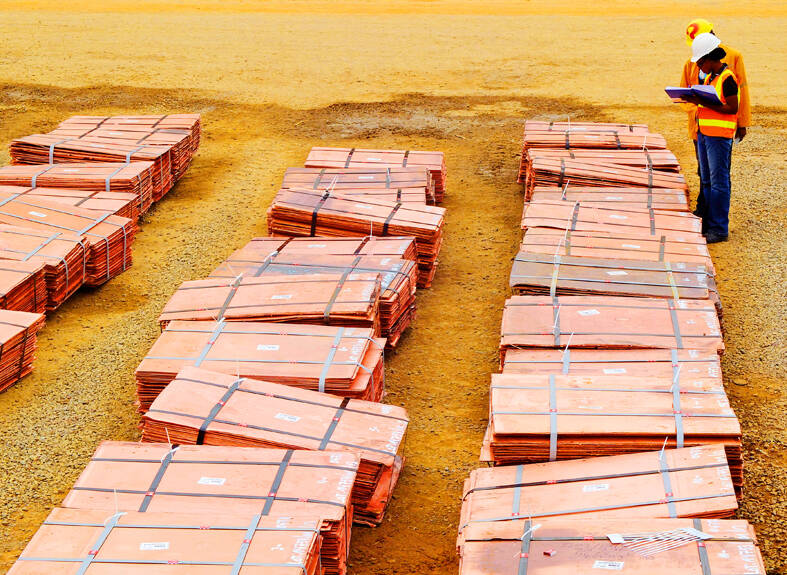Rawbank SARL forecast that its lending to the Democratic Republic of the Congo’s (DR Congo) mining industry would rise more than 20 percent to more than US$1 billion this year, buoyed by rising demand and strong prices for the country’s strategic minerals.
The bank’s mining-linked loan book increased to US$820 million last year, nearly doubling its credit offerings from the year before, said Etienne Mabunda, commercial director at the Kinhsasa-based lender.
The figure includes credit to mining companies, subcontractors and salaried workers at large firms, he said.

Photo: Reuters
High mineral prices and a recent law requiring more Congolese to work as subcontractors in the industry led to “major investments” in the nation’s copper, cobalt, gold, tantalum, tin and tungsten industries last year, Mabunda said on Thursday in a written response to questions.
The transition to greener energy has led to a scramble for minerals needed to manufacture electric vehicles, solar panels and turbines. The DR Congo provides more than two-thirds of the key battery-mineral cobalt and is one of the world’s largest copper producers.
The government is also looking to develop chrome, nickel and lithium deposits, Congolese President Felix Tshisekedi said last week.
Ivanhoe Mines Ltd, CMOC Group Ltd and Eurasian Resources Group SARL are all expanding their operations in the DR Congo, while BHP Group and Anglo American PLC have considered entering the market, which has a risky reputation because of a history of rampant corruption.
“I think Central Africa is in its primacy in terms of its current ability to provide these metals and minerals we need,” Anglo American CEO Duncan Wanblad said in an interview in Cape Town on Monday. “If policy works, then there’s no reason why a company like us can’t be looking in those sorts of places.”
Gold for April delivery fell US$4 to US$1,874.50 an ounce, down 0.11 percent from the previous week.
In other commodities:
‧ Silver for March delivery fell US$0.06 to US$22.08 an ounce, dropping 1.47 percent for the week.
‧ March copper fell US$0.08 to US$4.02 a pound, down 0.99 percent weekly.
Additional reporting by staff writer, with AP

TRADE WAR: Tariffs should also apply to any goods that pass through the new Beijing-funded port in Chancay, Peru, an adviser to US president-elect Donald Trump said A veteran adviser to US president-elect Donald Trump is proposing that the 60 percent tariffs that Trump vowed to impose on Chinese goods also apply to goods from any country that pass through a new port that Beijing has built in Peru. The duties should apply to goods from China or countries in South America that pass through the new deep-water port Chancay, a town 60km north of Lima, said Mauricio Claver-Carone, an adviser to the Trump transition team who served as senior director for the western hemisphere on the White House National Security Council in his first administration. “Any product going

High above the sparkling surface of the Athens coastline, the cranes for building the 50-floor luxury tower centerpiece of Greece’s future “smart city” look out over the Saronic Gulf. At their feet, construction machinery stirs up dust. Its backers say the 8 billion euro (US$8.43 billion) project financed by private funds is a symbol of Greece’s renaissance after the years of financial stagnation that saw investors flee the country. However, critics see it more as a future “ghetto for the rich.” It is hard to imagine that 10km from the Acropolis, a new city “three times the size of Monaco”

STRUGGLING BUSINESS: South Korea’s biggest company and semiconductor manufacturer’s buyback fuels concerns that it could be missing out on the AI boom Samsung Electronics Co plans to buy back about 10 trillion won (US$7.2 billion) of its own stock over the next year, putting in motion one of the larger shareholder return programs in its history. South Korea’s biggest company would repurchase the stock in stages over the coming 12 months, it said in a regulatory filing on Friday. As a first step, it would buy back about 3 trillion won of paper starting today up until February next year, all of which it would cancel. The board would deliberate on how best to effect the remaining 7 trillion won of buybacks. The move

In a red box factory that stands out among the drab hills of the West Bank, Chat Cola’s employees race to quench Palestinians’ thirst for local products since the Gaza war erupted last year. With packaging reminiscent of Coca-Cola’s iconic red and white aluminum cans, Chat Cola has tapped into Palestinians’ desire to shun brands perceived as too supportive of Israel. “The demand for [Chat Cola] increased since the war began because of the boycott,” owner Fahed Arar said at the factory in the occupied West Bank town of Salfit. Julien, a restaurateur in the city of Ramallah further south,